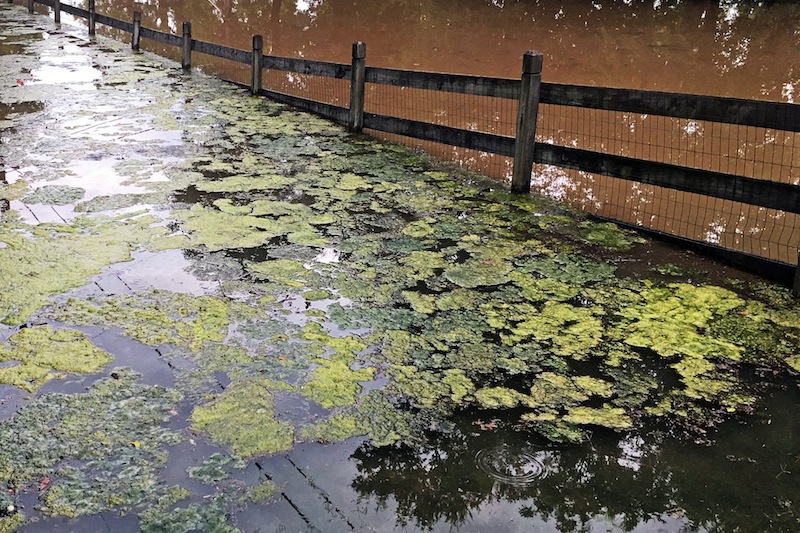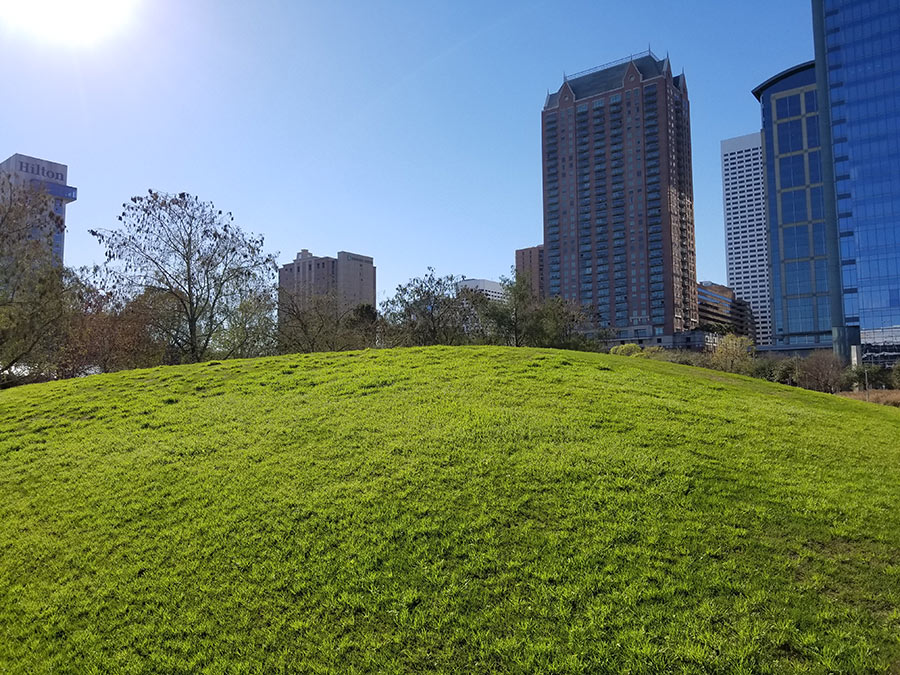
- Hundreds of Homes Impacted by Historic Flooding in Fort Bend County [Houston Public Media]
- Construction To Start This Month on Model Homes for First Phase of Elyson Community Near Grand Parkway [Realty News Report]
- Transwestern Sells Sugar Land Business Park Tract To Be Developed into a New School [HBJ]
- Houston’s Hostel Scene Slowly Grows with Midtown Hostel Slated To Debut Next Year [Houston Chronicle]
- Boutique Stationary Bike Company Peloton To Open Houston Showroom in the Galleria [HBJ]
- EaDo’s The Cajun Stop To Slowly Turn Spring’s The Tamale Pot into Second Location [Culturemap]
- Houston Falls 18 Spots to No. 24 Among Large Cities on Forbes’s ‘Best Cities For Jobs’ List [HBJ]
- ExxonMobil May Face Many Millions in Fines After Federal Court Reverses Baytown Refinery Decision [Houston Public Media]
Photo of flooding in Richmond: Bill Barfield via Swamplot Flickr Pool
Headlines





I think this is a very fair statement for both involved parties. Would like to hear TCEQs side of the story for sure.
.
““We think it is possible that the agreement between Exxon and the TCEQ is a sterling example of regulatory capture at its worst; however, it is also entirely possible that Exxon’s explanation for pursuing the agreement—that it wanted more “certainty†in enforcement—is valid and that the company did want to take good-faith steps towards reducing future compliance issues.—
Fort Bend County flooding: in one short article, one resident reports never having seen anything similar, another is thinking of moving to higher ground, and the data collected is “record-breaking.”
However we react, should we still not mention, much less speculate about human-induced climate change?
Hard to believe the numbers on the hostel. To reach 14,000 stays a year, it’d have to have 96% occupancy every single day.
I heard a report on NPR the other day regarding Houston’s unusually wet weather. They mentioned that even Allen brothers mentioned recorded periods of time which were ridiculously rainy. It seems Houston has natural cycles of heavy rains. This year such cycle is combined with El Niño and here we are.
—
This has no bearing on fact that global climate change causes by human activity is a scientific consensus. Although I wouldn’t take an extremely alarmist tone like some people might for simple reason that people can move, it’s an inconvenience, not a disaster.
Houstonreader,
“However we react, should we still not mention, much less speculate about human-induced climate change?”
The fact that it sometimes rains and floods in the “former” low lying Gulf Coast swamp we call Houston shouldn’t really cause much more speculation about climate change than the fact that it sometimes gets real cold in the winter.
Are we really trying to blame the Brazos River flooding, on uh, errr, climate change? Any idea why the Brazos flood plain is so fertile. My guess is that it is from past historic floods of said Brazos River.
@ Houstonreader
Please see flood of 1913. Not everyone needs blatant political propaganda to prop up their articles (i.e. wasn’t a chron article). A better article would be on the effects of flooding as it pertains to differences in Brazos watershed since introduction of numerous reservoirs along its course after 1950 and if in fact we are seeing less or more flooding due to these changes.
“Although I wouldn’t take an extremely alarmist tone like some people might for simple reason that people can move, it’s an inconvenience, not a disaster.”
.
exactly, dumb polar bears should’ve learned how to swim long distances thousands of years ago. Not our fault, we’re not gods.
Joel, ever notice people easing away at parties?
@ joel, commonsense, turning basin, Bocephus: You collectively mistake me for someone who 1) believes that the Brazos river or the city of Houston have never before flooded and 2) who attributes the cause of the current flooding solely to human-induced climate change. Strawman in both cases.
.
Instead, my question is to what degree human activity in the form of burning fossil fuels might have contributed to the flooding. If you wish, we can also speculate about pumping liquids out of the ground, or damming rivers, or paving over the prairie as other, possibly proximate, causes of flooding in our region.
.
So far, though, the responses have uniformly dismissed climate change from consideration. As expected.
Global climate change discussions supported by anecdotal evidence are always dangerous and rarely winnable. Might want to go with a little longer term evidence; for example: http://climate.nasa.gov/climate_resources/24/
@j, i got kids man. these things called “people” and “parties” are of no concern.
.
@houstonreader, i thought the sarcasm was readily apparent, though apparently everyone’s a hater. I think everyone in this thread agrees that yes, climate change is a thing and humans are contributing to it. At least that’s what 99.9% of the credentialed experts on these topics agree on. With that said, it has been a significant El Nino period and Houston has experienced tremendous growth & development since our last record floods so there’s really just too much to speculate on for the general public to have a strong opinion or idea if climate change could be a contributing factor. Most folks like myself don’t keep up with the meteorological details, but haven’t the heavy deluges from these past few months been primarily localized events in the south/plains areas? If discussing climate change I tend to think of major changes to continental weather patterns with northernly fronts moving further and further south.
@Houstonreader: To answer your questions (“… to what degree human activity in the form of burning fossil fuels might have contributed to the flooding[?]”):
.
No one can say. Local flooding events could be better or worse due to global climate change. The system is far too complicated to extrapolate specific effects like that. Tweezing out which parts of climate change are man made and which aren’t muddies the water even further, so the question has no answer.
Houstonreader, like Chuck Norris, I dont make mistakes.
–
My question is, to what degree to volcanoes add to global warming?
–
And to address your question. More fossil fuels burning, leads to more Co2, which means more trees, which means less water. Which means less flooding.
Just think, if Chaca had encouraged Ta and Sa to buy carbon offsets that darn land bridge would still be there.
@ Al: agreed.
.
@ joel and Memebag: those are sensible answers, and both recognize the impact of human activity in the changing climate, even if to an unknown degree. (joel, I think it worth pointing out that citing El Niño only raises the question of why an exceptional 2-year-long and unusually strong El Niño at this point in history.)
.
Your responses, in my opinion, emphasize the question of what we should do, knowing as much as we know. I’ll make a suggestion: tax carbon.
@Houstonreader: Just five years ago Texas experienced the driest year on record. Perhaps global warming caused that. Perhaps global warming stopped that. If you’re going to blame the weather on humans, you ought to give them credit, too.
@ Memebag: neither flooding nor drought are good things, so I disagree that any “credit” is due. Instead, if humans are responsible for the extremes of the new climate, then it’s on humans to fix the problems that they’re creating. Like I said, tax carbon.